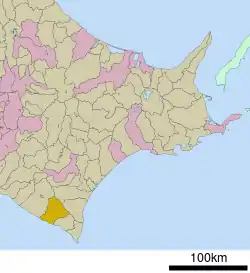Urakawa
浦河町 | |
|---|---|
Town | |
 Port of Urakawa | |
 Flag  Seal | |
 Location of Urakawa in Hokkaido (Hidaka Subprefecture) | |
 Urakawa Location in Japan | |
| Coordinates: 42°10′N 142°46′E / 42.167°N 142.767°E | |
| Country | Japan |
| Region | Hokkaido |
| Prefecture | Hokkaido (Hidaka Subprefecture) |
| District | Urakawa |
| Government | |
| • Mayor | Kōichirō Tanikawa |
| Area | |
| • Total | 694.24 km2 (268.05 sq mi) |
| Population (1 October 2020) | |
| • Total | 12,074 |
| • Density | 17/km2 (45/sq mi) |
| Time zone | UTC+09:00 (JST) |
| City hall address | 1-3-1, Tsukiji, Urakawa-chō, Urakawa-gun, Hokkaidō 057-8511 |
| Climate | Dfb |
| Website | www |
| Symbols | |
| Flower | Hidaka Yamatsutsuji (Rhododendron kaempferi var. kaempferi) |
| Mascot | Uraran (うららん) and Kawatan (かわたん) |
| Tree | Hidaka Japanese White Pine |
Urakawa (浦河町, Urakawa-chō) is a town located in Hidaka Subprefecture, Hokkaido, Japan. As of 1 October 2020, the town has an estimated population of 12,074 and a density of 17 persons per km2.[1] The total area is 694.24 km2.
Climate
Urakawa has a humid continental climate (Köppen Dfb) with warm summers and cold winters. Owing to its slightly more southerly latitude, easterly aspect and location on the sea, snowfall is much lighter than in the major cities of western Hokkaido like Sapporo, Hakodate, Asahikawa and Wakkanai, with the most in one month being 0.98 metres (38.6 in) in January 1969.[2] Precipitation in heaviest in the summer months when remnant typhoons may approach; the heaviest daily rainfall being 190.0 millimetres (7.48 in) on 5 August 1981 and the wettest month being 429.5 millimetres (16.91 in) in August 1995. The driest month has been 2.5 millimetres (0.10 in) in February 2003. Year-round sunshine, although less than in the Tokachi Plain, is also higher than western Hokkaido, with the dullest month being 48.0 hours in August 1941 and the sunniest, in April 2014, being 288.0 hours, which beats the previous record of 271.6 hours in May 1957.
| Climate data for Urakawa (1991−2020 normals, extremes 1927−present) | |||||||||||||
|---|---|---|---|---|---|---|---|---|---|---|---|---|---|
| Month | Jan | Feb | Mar | Apr | May | Jun | Jul | Aug | Sep | Oct | Nov | Dec | Year |
| Record high °C (°F) | 10.9 (51.6) |
10.9 (51.6) |
16.5 (61.7) |
21.0 (69.8) |
23.5 (74.3) |
27.2 (81.0) |
30.7 (87.3) |
31.5 (88.7) |
29.9 (85.8) |
23.7 (74.7) |
19.1 (66.4) |
14.3 (57.7) |
31.5 (88.7) |
| Mean daily maximum °C (°F) | 0.9 (33.6) |
1.2 (34.2) |
4.4 (39.9) |
8.9 (48.0) |
13.5 (56.3) |
16.9 (62.4) |
20.7 (69.3) |
23.0 (73.4) |
21.4 (70.5) |
16.2 (61.2) |
9.8 (49.6) |
3.6 (38.5) |
11.7 (53.1) |
| Daily mean °C (°F) | −2.4 (27.7) |
−2.1 (28.2) |
0.9 (33.6) |
5.2 (41.4) |
9.7 (49.5) |
13.5 (56.3) |
17.7 (63.9) |
19.9 (67.8) |
17.7 (63.9) |
12.3 (54.1) |
6.1 (43.0) |
0.1 (32.2) |
8.2 (46.8) |
| Mean daily minimum °C (°F) | −5.7 (21.7) |
−5.6 (21.9) |
−2.5 (27.5) |
1.8 (35.2) |
6.4 (43.5) |
10.7 (51.3) |
15.3 (59.5) |
17.4 (63.3) |
14.4 (57.9) |
8.3 (46.9) |
2.5 (36.5) |
−3.1 (26.4) |
5.0 (41.0) |
| Record low °C (°F) | −15.5 (4.1) |
−14.8 (5.4) |
−13.1 (8.4) |
−8.1 (17.4) |
−2.5 (27.5) |
2.3 (36.1) |
6.5 (43.7) |
8.9 (48.0) |
1.9 (35.4) |
−1.3 (29.7) |
−7.9 (17.8) |
−13.1 (8.4) |
−15.5 (4.1) |
| Average precipitation mm (inches) | 34.0 (1.34) |
28.9 (1.14) |
48.8 (1.92) |
77.9 (3.07) |
125.3 (4.93) |
95.9 (3.78) |
141.5 (5.57) |
161.6 (6.36) |
144.4 (5.69) |
117.7 (4.63) |
83.4 (3.28) |
59.0 (2.32) |
1,118.4 (44.03) |
| Average snowfall cm (inches) | 41 (16) |
35 (14) |
19 (7.5) |
1 (0.4) |
0 (0) |
0 (0) |
0 (0) |
0 (0) |
0 (0) |
0 (0) |
4 (1.6) |
28 (11) |
128 (50.5) |
| Average precipitation days (≥ 1.0 mm) | 7.7 | 6.7 | 7.4 | 9.4 | 10.4 | 8.6 | 10.7 | 10.1 | 10.0 | 10.8 | 12.1 | 11.0 | 114.9 |
| Average snowy days | 11.7 | 10.1 | 5.1 | 0.5 | 0 | 0 | 0 | 0 | 0 | 0 | 1.3 | 8.2 | 36.9 |
| Average relative humidity (%) | 65 | 68 | 72 | 78 | 83 | 90 | 92 | 90 | 84 | 75 | 69 | 65 | 78 |
| Mean monthly sunshine hours | 142.0 | 160.8 | 194.2 | 187.9 | 187.2 | 145.0 | 115.6 | 136.0 | 163.4 | 172.2 | 121.7 | 113.2 | 1,839.2 |
| Source 1: Japan Meteorological Agency (precipitation)[3] | |||||||||||||
| Source 2: Japan Meteorological Agency[4][5] | |||||||||||||
Transportation
Rail
Urakawa was served by the JR Hokkaido Hidaka Main Line. However, no trains have operated between Mukawa and Samani since January 2015, due to storm damage. Plans to restore this section of the line have been abandoned, due to declining passenger numbers and very high maintenance costs, and the section was officially closed on 1 April 2021 and replaced by a bus service.
Defunct railway stations in Urakawa: Ogifushi - Efue - Urakawa - Higashichō - Hidaka-Horobetsu
Culture
Mascot

Urakawa's mascots are Uraran (うららん) and Kawatan (かわたん). They are twin horses.[6][7]
- Uraran carries a strawberry.
- Kawatan carries a Hidaka kelp and a Ginsei salmon.
References
- ↑ "Urakawa (Hokkaidō , Japan) - Population Statistics, Charts, Map, Location, Weather and Web Information". www.citypopulation.de. Retrieved 2023-10-26.
- ↑ Japan Meteorological Agency; 観測史上1~10位の値(年間を通じての値)
- ↑ "浦河 平年値(年・月ごとの値) 詳細(気圧・降水量)". Japan Meteorological Agency. Retrieved January 28, 2016.
- ↑ "浦河 平年値(年・月ごとの値) 主な要素". Japan Meteorological Agency. Retrieved January 28, 2016.
- ↑ 観測史上1~10位の値(年間を通じての値). JMA. Retrieved February 17, 2022.
- ↑ "イメージキャラクターの愛称が決まりました". Kawaii Hokkaido.
- ↑ "うららん&かわたんのプロフィール(浦河町)". Kawaii Hokkaido.
External links
 Media related to Urakawa, Hokkaidō at Wikimedia Commons
Media related to Urakawa, Hokkaidō at Wikimedia Commons- Official Website (in Japanese)